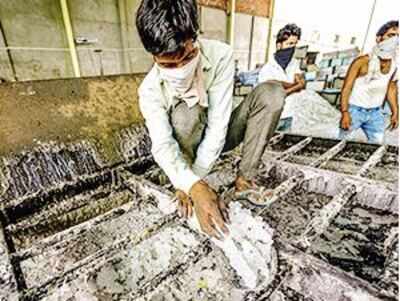
JAIPUR: Despite having the mandate to lend to the MSMEs, the Rajasthan Finance Corporation’s share of loans to the sector ranged between 1.19-1.27%, while its gross non-performing assets stood at 23.20%, which was very high as it constituted almost one fourth of total outstanding dues, the CAG said in its latest report.
Its audit also found that the employees cost of the corporation was much higher as compared to other state finance corporations in Kerala and Karnataka.
“The corporation (RFC) was not able to keep pace with the growing demand for industrial loans to MSME sector as the portfolio ranged between 1.19% and 1.27% of the total outstanding industrial loans during 2015-18,” the CAG said in its report for the financial year 2018-19.
Further, it found, the employee cost of RFC to the total sanctioned loan was much higher and ranged between 9.58% and 13.71% during 2015-19. The same for Kerala Financial Corporation (between 2.19% and 7.43%) and Karnataka State Finance Corporation (between 7.61% and 9.10%) was considerably lower compared to RFC.
“The audit observed that the performance of Karnataka State Finance Corporation was good as its loan portfolio increased from Rs 732 crore to Rs 1,099 crore during 2015-19, whereas the loan portfolio of RFC decreased from Rs 410 crore to Rs 315 crore during 2016-19,” revealed the report.
Though RFC earned a marginal profit during 2017-19, considering the accumulated losses, negligible market share and high employee cost, the corporation was not able to achieve its prime objective, said the report.
During the scrutiny, the accounting watchdog of the government said that in five cases, RFC allowed sale of partial mortgaged property without recovery of the committed dues, extended loans against the property occupied by tenants, did not take prompt recovery action against defaulters suspected in Syndicate Bank scam, released fourth loan to a borrower who had defaulted on previous three loans and released loan without ensuring requisite collateral security which resulted in accumulation of outstanding dues worth Rs 28.50 crore.
The corporation also failed to dispose of the properties taken into possession which resulted in accumulation of dues. Out of 28 units in possession of the corporation, 25 units were under possession for a period ranging between seven months and 32 years. In commercial real estate cases, due to litigations and non-disposal of the properties significant dues were accumulated and exceeded beyond market realisable value of the properties.
Its audit also found that the employees cost of the corporation was much higher as compared to other state finance corporations in Kerala and Karnataka.
“The corporation (RFC) was not able to keep pace with the growing demand for industrial loans to MSME sector as the portfolio ranged between 1.19% and 1.27% of the total outstanding industrial loans during 2015-18,” the CAG said in its report for the financial year 2018-19.
Further, it found, the employee cost of RFC to the total sanctioned loan was much higher and ranged between 9.58% and 13.71% during 2015-19. The same for Kerala Financial Corporation (between 2.19% and 7.43%) and Karnataka State Finance Corporation (between 7.61% and 9.10%) was considerably lower compared to RFC.
“The audit observed that the performance of Karnataka State Finance Corporation was good as its loan portfolio increased from Rs 732 crore to Rs 1,099 crore during 2015-19, whereas the loan portfolio of RFC decreased from Rs 410 crore to Rs 315 crore during 2016-19,” revealed the report.
Though RFC earned a marginal profit during 2017-19, considering the accumulated losses, negligible market share and high employee cost, the corporation was not able to achieve its prime objective, said the report.
During the scrutiny, the accounting watchdog of the government said that in five cases, RFC allowed sale of partial mortgaged property without recovery of the committed dues, extended loans against the property occupied by tenants, did not take prompt recovery action against defaulters suspected in Syndicate Bank scam, released fourth loan to a borrower who had defaulted on previous three loans and released loan without ensuring requisite collateral security which resulted in accumulation of outstanding dues worth Rs 28.50 crore.
The corporation also failed to dispose of the properties taken into possession which resulted in accumulation of dues. Out of 28 units in possession of the corporation, 25 units were under possession for a period ranging between seven months and 32 years. In commercial real estate cases, due to litigations and non-disposal of the properties significant dues were accumulated and exceeded beyond market realisable value of the properties.
Quick Links
Kerala Coronavirus Helpline NumberHaryana Coronavirus Helpline NumberUP Coronavirus Helpline NumberBareilly NewsBhopal NewsCoronavirus in DelhiCoronavirus in HyderabadCoronavirus in IndiaCoronavirus symptomsCoronavirusRajasthan Coronavirus Helpline NumberAditya ThackerayShiv SenaFire in MumbaiAP Coronavirus Helpline NumberArvind KejriwalJammu Kashmir Coronavirus Helpline NumberSrinagar encounter
Get the app










